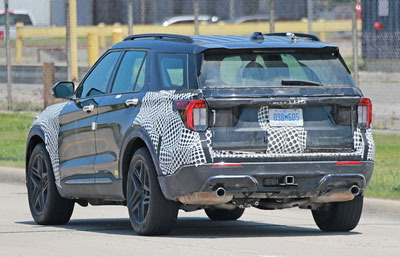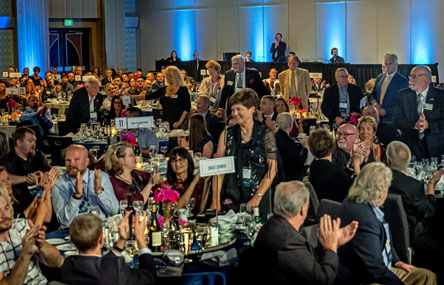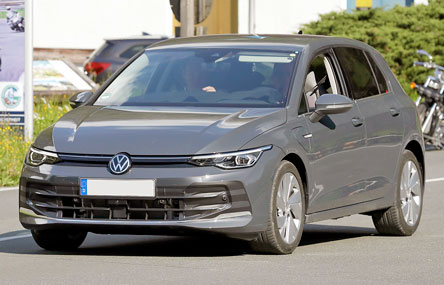By SEMA Editors
Ford has unveiled the Mustang GT3 race car, based on the all-new '24 Mustang Dark Horse, during a special ceremony as part of this year's 24 Hours of Le Mans.
Mustang Dark Horse, during a special ceremony as part of this year's 24 Hours of Le Mans.
The automaker also announced plans to enter the GT3 into the iconic endurance race's FIA GT3 category in 2024, along with an entry in the 2024 World Endurance Championship season under Proton Competition, the German team led by team principal Christian Ried.
"It is not Ford versus Ferrari anymore. It is Ford versus everyone," said Jim Farley, CEO of Ford Motor Co.
Multimatic will build and support the GT3s, while M-Sport will assemble the Ford Performance-developed 5.4 L Coyote-based V8 engines. The GT3 features a bespoke short-long arm suspension, rear-mounted transaxle gearbox, carbon fiber body panels, and an aero package developed to meet GT3 targets.
In addition, the automaker announced a new Ford Performance branding described as a "cleaner, simplified look" that will be integrated across its racing vehicles.
New E1 World Championship to Launch Inaugural Electric Powerboat Racing Season
UIM E1 World Championship--the world's first all-electric powerboat racing championship--has unveiled the venues that will host the first-ever racing season beginning in January 2024.
The season will launch in Jeddah, Saudi Arabia, followed by a to-be-determined location in the Middle East in February 2024. Two events--set for April and May 2024--will take place in the waters of Venice, Italy. Then, competitors will visit Monaco in July 2024, followed by Rotterdam, Netherlands, in September 2024.
Teams will race RaceBirds boats near the shore, allowing fans to view the action from land.
WyoTech Announces Inaugural Hall of Fame Class
WyoTech--the U.S. automotive, diesel and collision trade school based in Laramie, Wyoming--has announced its inaugural Hall of Fame class, with alumni including the late trailblazer known as "The Fastest Woman on Earth, a J ohn Deere master tech whose YouTube videos have garnered 8 million views, a custom car builder who returned as an instructor and more.
ohn Deere master tech whose YouTube videos have garnered 8 million views, a custom car builder who returned as an instructor and more.
"Each of the six alumni has achieved tremendous career success and demonstrates WyoTech's capability of training students to succeed across the entire spectrum of the trade industry," said Jim Mathis, president and CEO of WyoTech. "We're honored to recognize them as the first inductees of WyoTech's Hall of Fame and to show the public the kind of impact our graduates have on the trade industry and the world."
To be eligible for the WyoTech Hall of Fame, alumni must be five years post-graduation and established in the industry.
The inaugural WyoTech Hall of Fame Class is (in alphabetical order):
- John Alonzo is the racing operations-marketing director for the race shop at Scoggin Dickey Parts Center in Lubbock, Texas, one of the world's leading dealers of high-performance engines and GM parts.
- Jessi Combs (1980-2019): The late Combs broke stereotypes and records by joining the North American Eagle Supersonic Speed Challenger team and, in 2013, became "The Fastest Woman on Four Wheels" at 398 mph, with a top speed of 440 mph. In 2019, she set a new women's landspeed world record at 522.783 mph before the accident that took her life. That feat and her career were memorialized in the HBO Max documentary "The Fastest Woman on Earth."
- Dave Gilley is the founder and owner of Gilleyfab Enterprises, near Salt Lake City, Utah, known for top-tier, fine-quality fabrication in the UTV industry.
- Levi Green is the owner and instructor of HammerFab near Austin, Texas, which specializes in handcrafting upscale turnkey customs and industry-leading fabrication tools and parts.
- Zeth Key is a Master John Deere service technician at a Sloan Implement location in Illinois. In April 2008, he launched a YouTube channel in honor of his late friend Jake to promote the trade they loved and to "inspire a younger generation to pick up a wrench and start a great career" keeping agriculture running. In two years, the channel grew to 63,000 subscribers and 8 million views.
- Randy Svalina is a WyoTech specialties instructor who teaches students a curriculum and a way of life that helps their families and communities. "As a part of WyoTech, we help others reach their goals, their dreams, raise their families and succeed in their journey," he said.
For more racing news, visit performanceracing.com/industry-news.





 SEMA-supported American Families and Jobs Act, a legislative package comprised of three bills from Committee Chairman Jason Smith (R-MO): the Tax Cuts for Working Families Act (H.R. 3936), the Small Business Jobs Act (H.R. 3937), and the Build It in America Act (H.R. 3938). The bill includes key provisions that will benefit automotive aftermarket businesses, including a 100% bonus depreciation for qualified property, expanded small business expensing to $2.5 million and the restoration of immediate expensing for Research and Development (R&D) for tax years 2021 through 2025. The bill would also create full expensing for machines and equipment. The American Families and Jobs Act now awaits consideration on the floor of the U.S. House of Representatives.
SEMA-supported American Families and Jobs Act, a legislative package comprised of three bills from Committee Chairman Jason Smith (R-MO): the Tax Cuts for Working Families Act (H.R. 3936), the Small Business Jobs Act (H.R. 3937), and the Build It in America Act (H.R. 3938). The bill includes key provisions that will benefit automotive aftermarket businesses, including a 100% bonus depreciation for qualified property, expanded small business expensing to $2.5 million and the restoration of immediate expensing for Research and Development (R&D) for tax years 2021 through 2025. The bill would also create full expensing for machines and equipment. The American Families and Jobs Act now awaits consideration on the floor of the U.S. House of Representatives. Mustang Dark Horse, during a special ceremony as part of this year's 24 Hours of Le Mans.
Mustang Dark Horse, during a special ceremony as part of this year's 24 Hours of Le Mans.  ohn Deere master tech whose YouTube videos have garnered 8 million views, a custom car builder who returned as an instructor and more.
ohn Deere master tech whose YouTube videos have garnered 8 million views, a custom car builder who returned as an instructor and more. Mono supercar--has announced an expansion with three new, state-of-the-art locations in the United States.
Mono supercar--has announced an expansion with three new, state-of-the-art locations in the United States.
 individuals who have made extraordinary contributions to the automotive industry.
individuals who have made extraordinary contributions to the automotive industry. Foundation--has passed away. He was 83. Kuhns was inducted into the SEMA Hall of Fame in 2002 and the SEMA Motorsports Parts Manufacturers Council (MPMC) Hall of Fame in 2016.
Foundation--has passed away. He was 83. Kuhns was inducted into the SEMA Hall of Fame in 2002 and the SEMA Motorsports Parts Manufacturers Council (MPMC) Hall of Fame in 2016.


